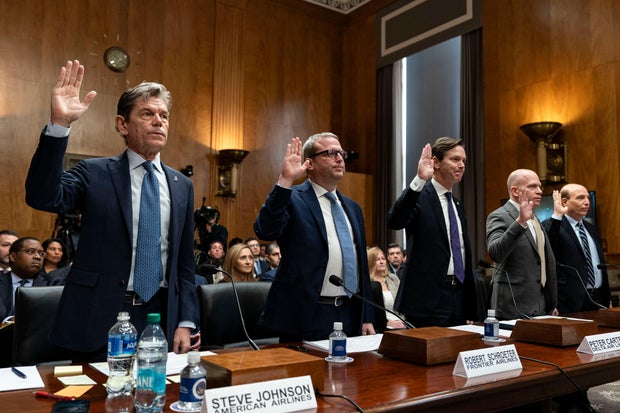Senators grill airlines over fees
Officials from some of the largest U.S. airlines faced intense questioning on Capitol Hill Wednesday over so-called junk fees passengers are being charged for baggage, seat selection and other services.
“Our investigation found that in 2023 alone, American, Delta, United, Frontier and Spirit collected more than $3 billion in seat fees — only seat fees. That’s not airfare, that’s just fees for booking a specific seat in advance, or selecting a slightly better seat,” said Sen. Richard Blumenthal in a hearing by the Senate Permanent Subcommittee on Investigations on the impact of such charges on consumers.
“And that’s an increase of 50% from 2018, just six years ago,” added the Connecticut Democrat, who chairs panel.
Overall, five U.S. carriers collected $12.4 billion in seat fees between 2018 and 2023, in addition to baggage and other charges, according to a report released last week by Democrats on the subcommittee.
Speaking on behalf of their respective airlines at the hearing were Steve Johnson, vice chair and chief strategy officer, American Airlines; Peter Carter, chief external affairs officer, Delta Air Lines; Andrew Nocella, EVP and chief commercial officer, United Airlines; Robert Schroeter, SVP, chief commercial officer, Frontier Airlines; and Matthew Klein, EVP and chief commercial officer, Spirit Airlines

“Terrible experience”
Sen. Josh Hawley criticized Frontier Airlines and Spirit Airlines during the two-hour hearing for bonuses paid to gate employees to charge customers extra fees for large carry-ons. The subcommittee says Spirit and Frontier paid employees $26 million in incentives to strictly enforce airline bag policies in 2022 and 2023.
“You guys do appreciate that flying on your airlines is a disaster, don’t you?” the Missouri Republican said, adding, “Flying on your airlines is horrible, it’s a terrible experience. I mean, I say this as a father of three young children. But I can’t tell you — nobody enjoys flying on your airlines, it’s a disaster.”
Spirit charges between $15 and $77 for a carry-on bag that won’t fit under a seat.
Airlines say that their fee policies are transparent and allow passengers to choose various travel experiences at different price points. Frontier said its incentive program aims to ensure “that all customers are treated equally and fairly,” CBS News’ Kris Van Cleave reported ahead of the Wednesday hearing.
“We respectfully disagree with numerous statements and conclusions contained in the report,” Spirit said.
Asked for his response to the subcommittee’s findings, United CEO Scott Kirby told Van Cleave, “At United at least, we’re 100% focused on getting customers to choose to fly United. If you don’t want to check a bag, you shouldn’t have to pay the implied cost of checking a bag. We’re creating options for customers and it’s working.”
Airline fees have been a frequent target of criticism by the Biden administration, all the way up to President Joe Biden. A Transportation Department rule that took effect in October entitles airline passengers to automatic refunds when flights are canceled or significantly delayed, while also requiring airlines to reveal fees upfront.
The airline industry is suing to block another regulation requiring more prominent disclosure of baggage and cancellation fees. An appeals court has blocked that rule, and its fate is uncertain under President-elect Donald Trump.
Anne Marie D. Lee is an editor for CBS MoneyWatch. She writes about topics including personal finance, the workplace, travel and social media.


